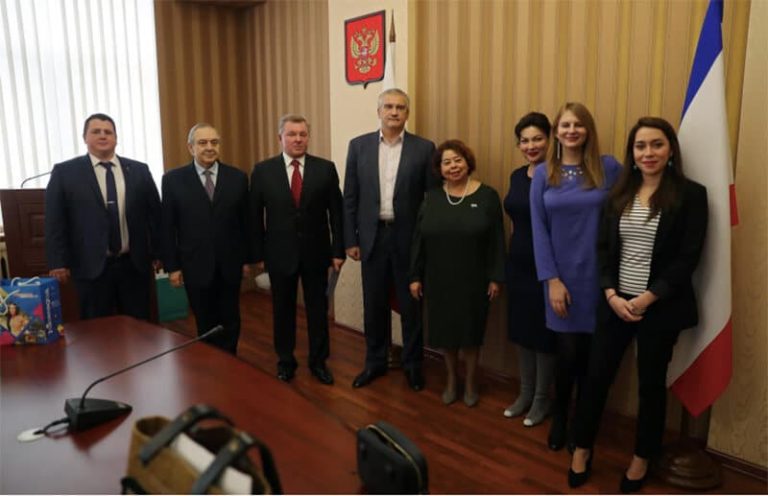3 de febrero 2021

Children of Exile: The Births “Sowing Hope” in the Camp of Nicaraguan Farmers

PUBLICIDAD 1M
PUBLICIDAD 4D
PUBLICIDAD 5D
The Ukrainian congress has approved “sanctions against certain economic sectors and other restrictions,” on the government of Daniel Ortega

The Rada, the Ukraine ’s parliament, has approved sanctions against Nicaragua. The decision was ratified on February 2nd, in response to Nicaragua’s decision to open an honorary consulate on the Crimean Peninsula. Russia annexed Crimea in 2014. Before Russia’s military takeover, the territory had been under Ukrainian sovereignty.
The decision regarding “sanctions against economic sectors and other restrictions against Nicaraguan” was approved by a large majority. Of 405 deputies in the Ukrainian congress, 322 voted in favor of the measure, according to local media reports.
Last November, the Ukrainian government in Kiev protested the inauguration of a Nicaraguan diplomatic mission on the peninsula. Oleg Belaventsev’s appointment as honorary consul in Crimea is part of this mission. The Ukrainian government considers the step a violation of Ukrainian “sovereignty and territorial integrity.” Back in November, it had already threatened to take measures in reprisal for the Nicaraguan action.
The Ukrainian government termed the inauguration of a Nicaraguan consulate in Crimea “an openly unfriendly step” on the part of Nicaragua.
Ukrainian diplomats continue disputing control over Crimea. They feel the only legal entry to Crimea must be from Ukrainian territory.
In November 2020, the Ukrainian Ministry of Foreign Affairs began the process of imposing sanctions on Nicaragua. The official rationale was for the “violation of the territorial integrity of the State”. The immediate cause was the Honorary Consulate that Nicaragua opened in Crimea, a territory annexed by Russia in 2014. The Ukrainian news site “Hromadske” shared with Confidencial some of the history involved.
According to the Ukrainian Ministry of Foreign Affairs, Nicaragua “violated Ukrainian legislation and international law”. They view Nicaragua’s designation of an Honorary Consul in the Federation of Russia as an endorsement of Russia’s takeover.
Further, the Ortega regime named Oleg Belaventsev, a retired Russian military officer, to the position. A 2015 investigation, however, implicated Belaventsev in a corruption scandal involving a multi-million-dollar Russian donation to the Ortega government.
In November 2015, Confidencial revealed that a large Russian donation to Nicaragua had become the object of a Moscow corruption scandal. The multi-million-dollar donation was aimed at reinforcing Nicaragua’s National System for Natural Disaster Prevention and Control. A journalistic investigation by the “Organized Crime and Corruption Reporting Project” (OCCRP) disclosed details of the corruption scheme. According to OCCRP, the ex-director of Russia’s Emergency Ministry utilized the humanitarian aid contracts to benefit his own private companies.
That Russian functionary was Oleg Belaventsev, a man close to President Vladimir Putin. Now, Nicaragua has appointed him their honorary consul in Crimea. Belaventsev has held other important posts in the Kremlin. In March 2014, he became Putin’s special envoy to the Crimean region. Previously, he directed the Emergency Ministry, known internationally as EMERCOM, for nearly ten years.
Belaventsev visited Nicaragua in August 2008, to officially present a donation from EMERCOM. The donation, worth US $26.6 million dollars, was earmarked for Nicaragua’s National System for Disaster Prevention, Mitigation and Attention. At that time, Belaventsev met with Daniel Ortega, who thanked him for the donation. According to the OCCRP investigation, the Nicaraguan ruler then requested additional aid from Russia. They accordingly promised, and later delivered, fire engines and portable hospitals for the Nicaraguan Army.
Nicaragua’s Foreign Ministry first announced the opening of an honorary Nicaraguan Consulate in Crimea in August 2020. At that time, Ukrainian diplomats called on the Nicaraguan authorities to revoke their decision. But on November 10, 2020, Russian pro-government media were already informing that Oleg Belaventsev had been named Nicaragua’s Consul.
According to media sources, the “Honorary Nicaraguan Consulate” is the first foreign mission in Crimea since its annexation. Authorities proclaim that Crimea and Nicaragua are going to cooperate in the area of education. “So that many Nicaraguan students can study on the Crimean Peninsula.”
Sputnik, a media outlet sympathetic to the government of Vladimir Putin, offered some details about Oleg Belaventsev. He’s a retired Russian Assistant Admiral, 69 years old. His most recent position was as Russia’s presidential envoy “to the Federal Districts of Crimea and the Northern Caucasus.” Belaventsev has received a number of awards “including the title of Russian Hero, the country’s highest military honor.”
Sputnik quoted Serguei Aksionov, Russian-appointed head of Crimea, on the subject of the Nicaraguan Consul. Aksionov declared that the appointment of Belaventsev “is the sovereign right” of Nicaragua. He felt the Central American country has “a fair and honest attitude, with respect to the Crimea.”
Nonetheless, Nicaragua remains one of only four UN member countries to recognize Russia’s annexation of the Crimean Peninsula. The others are Afghanistan, Syria and Venezuela.
Archivado como:
PUBLICIDAD 3M
Confidencial es un diario digital nicaragüense, de formato multimedia, fundado por Carlos F. Chamorro en junio de 1996. Inició como un semanario impreso y hoy es un medio de referencia regional con información, análisis, entrevistas, perfiles, reportajes e investigaciones sobre Nicaragua, informando desde el exilio por la persecución política de la dictadura de Daniel Ortega y Rosario Murillo.
PUBLICIDAD 3D